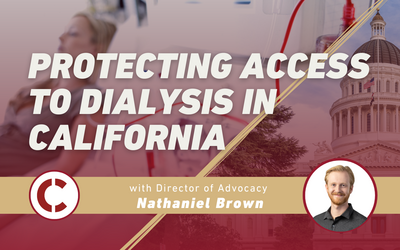
California voters have been asked to weigh in – for a third time – on a proposal that could lead to the closure of dialysis clinics in needed areas of the state by going beyond current federal regulations and requiring them to have an additional physician, nurse practitioner, or physician assistant on site during all patient treatment hours.
A nearly identical proposal was rejected by voters in 2020 by 63% of the vote. The voters clearly understood that this proposal was not in the patients’ best interest, as dialysis is already delivered under the coordination and supervision of a team of healthcare professionals – doctors, nurses, patient care technicians, dieticians, social workers.
Prop 29 would be no different; by California budget analyst estimates, this staffing requirement could cost each dialysis center hundreds of thousands of dollars each year—and that assumes they can even find and hire enough staff. And if they can’t find or afford enough staff, the clinics will have to close.
California newspapers from San Diego to San Francisco have come out in strong opposition.
“The proponents say the proposition is intended to improve patient care. It’s an assertion they can’t back up with evidence,” writes the Los Angeles Times. “Nor is there evidence that the current arrangement has harmed patients.”
The proposition has even garnered attention from the national level, with the Wall Street Journal’s editorial board asserting, “Some clinics could be forced to close entirely, disrupting treatment for thousands of Californians who need it to stay alive.”
At the Chronic Disease Coalition, we advocate throughout the country on issues that protect and expand access to healthcare. While this initiative may have been well-intended, constricting the types of providers also constricts patients’ access to services, especially in rural parts of the state.
Dialysis clinics – like all healthcare facilities – are facing serious staffing challenges right now that would be exacerbated by a requirement like this. Patients, providers, and community leaders are lining up to oppose this concept because it doesn’t improve quality of care and hurts patients’ access.
Organizations from the Renal Support Network and Dialysis Patient Citizens, to the California Senior Advocates League, to the California Medical Association and the Minority Health Institute – among many others – are all joining together to encourage voters to reject this proposal.
It’s evident that this proposition could have long-term negative impacts on California patients. The Chronic Disease Coalition urges patients, providers, advocates, and others to work together to make it easier, not harder, for kidney patients to get the care they deserve.